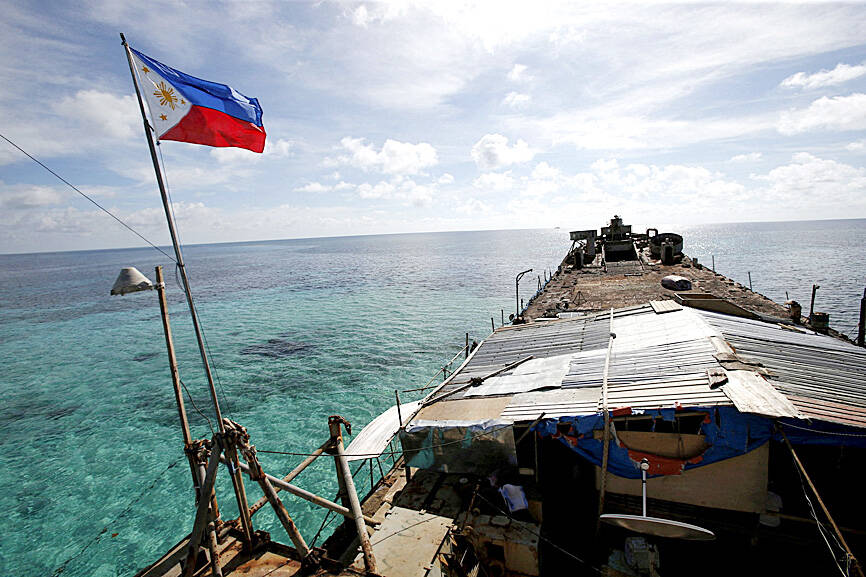The Philippine government yesterday said that it has filed a diplomatic protest against Beijing after Chinese jets flew dangerously close and fired a volley of flares in the path of a Philippine air force patrol plane over a disputed shoal in the South China Sea.
The Chinese jets’ hostile actions against the Philippine military’s NC-212i light transport plane over the Scarborough Shoal (Huangyan Island, 黃岩島) on Thursday last week was the first such aerial encounter since hostilities between Beijing and Manila in the busy seaway started to flare last year.
Philippine military chief General Romeo Brawner Jr did not report any injuries or damage, but condemned the Chinese actions, which he said could have had tragic consequences.

Photo: Reuters
“If the flares came into contact with our aircraft, these could have been blown into the propeller or the intake or burned our plane,” Brawner told reporters. “It was very dangerous.”
Philippine Department of Foreign Affairs spokesperson Teresita Daza said without elaborating that a diplomatic protest has been sent to China.
Philippine President Ferdinand Marcos Jr over the weekend said that the actions by the Chinese air force jets were “unjustified, illegal and reckless.”
“We call on the government of the People’s Republic of China [PRC] to cease all forms of provocative and hazardous acts that could undermine the safety of Filipino military and civilian personnel in the waters or in the skies, destabilize regional peace, and erode the trust and confidence of the international community in the PRC,” a Philippine government task force overseeing the South China Sea said on Monday.
Despite the encounter, Philippine monitoring of its airspace would be intensified, the task force said.
The Southern Theater Command of the Chinese People’s Liberation Army on Saturday said that a Philippine air force plane “illegally” entered the airspace above the shoal, which China claims disrupted combat training activities.
The command sent jets and ships to identify, track and drive away the Philippine aircraft, it added.
The command warned the Philippines to “stop its infringement, provocation, distortion and hyping-up.”
China in 2013 announced a new air defense identification zone over the East China Sea that covers a chain of disputed islands also claimed by Japan. Beijing said then that all aircraft entering the zone must notify Chinese authorities and they would be subject to emergency military measures if they did not identify themselves or obey orders from Beijing.
Washington and its allies said the move was invalid and refused to recognize it.
Chinese officials had warned that Beijing could establish a similar air defense identification zone over the South China Sea if its sovereignty over the sea passage, a key global trade and security route, was threatened.

The US government has signed defense cooperation agreements with Japan and the Philippines to boost the deterrence capabilities of countries in the first island chain, a report by the National Security Bureau (NSB) showed. The main countries on the first island chain include the two nations and Taiwan. The bureau is to present the report at a meeting of the legislature’s Foreign Affairs and National Defense Committee tomorrow. The US military has deployed Typhon missile systems to Japan’s Yamaguchi Prefecture and Zambales province in the Philippines during their joint military exercises. It has also installed NMESIS anti-ship systems in Japan’s Okinawa

TRAGEDY STRIKES TAIPEI: The suspect died after falling off a building after he threw smoke grenades into Taipei Main Station and went on a killing spree in Zhongshan A 27-year-old suspect allegedly threw smoke grenades in Taipei Main Station and then proceeded to Zhongshan MRT Station in a random killing spree that resulted in the death of the suspect and two other civilians, and seven injured, including one in critical condition, as of press time last night. The suspect, identified as a man surnamed Chang Wen (張文), allegedly began the attack at Taipei Main Station, the Taipei Fire Department said, adding that it received a report at 5:24pm that smoke grenades had been thrown in the station. One man in his 50s was rushed to hospital after a cardiac arrest

ON ALERT: Taiwan’s partners would issue warnings if China attempted to use Interpol to target Taiwanese, and the global body has mechanisms to prevent it, an official said China has stationed two to four people specializing in Taiwan affairs at its embassies in several democratic countries to monitor and harass Taiwanese, actions that the host nations would not tolerate, National Security Bureau (NSB) Director-General Tsai Ming-yen (蔡明彥) said yesterday. Tsai made the comments at a meeting of the legislature’s Foreign Affairs and National Defense Committee, which asked him and Minister of National Defense Wellington Koo (顧立雄) to report on potential conflicts in the Taiwan Strait and military preparedness. Democratic Progressive Party (DPP) Legislator Michelle Lin (林楚茵) expressed concern that Beijing has posted personnel from China’s Taiwan Affairs Office to its

PUBLIC SAFETY: The premier said that security would be tightened in transport hubs, while President Lai commended the public for their bravery The government is to deploy more police, including rapid response units, in crowded public areas to ensure a swift response to any threats, President William Lai (賴清德) said yesterday after a knife attack killed three people and injured 11 in Taipei the previous day. Lai made the remarks following a briefing by the National Police Agency on the progress of the investigation, saying that the attack underscored the importance of cooperation in public security between the central and local governments. The attack unfolded in the early evening on Friday around Taipei Main Station’s M7 exit and later near the Taipei MRT’s Zhongshan